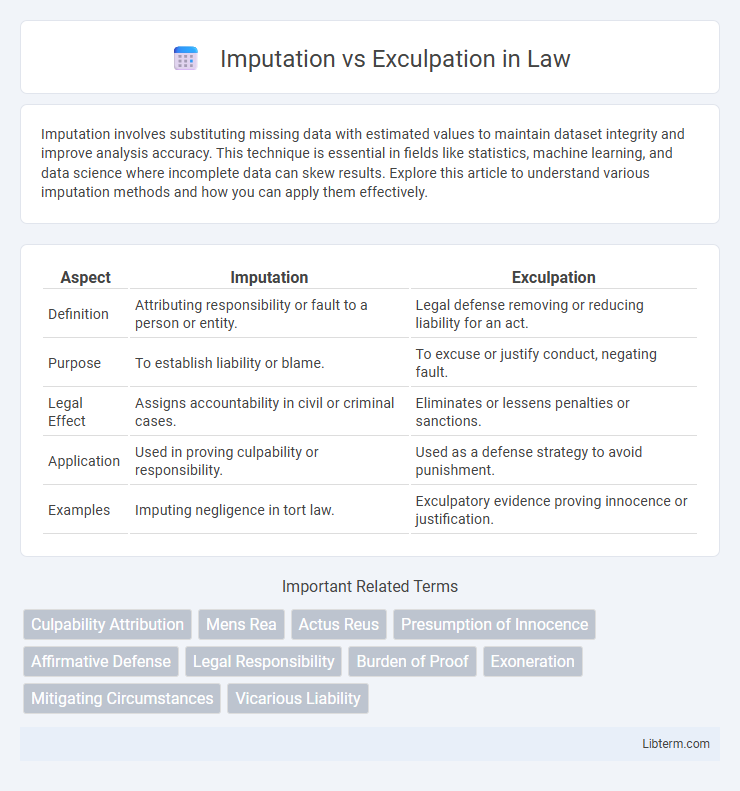Imputation involves substituting missing data with estimated values to maintain dataset integrity and improve analysis accuracy. This technique is essential in fields like statistics, machine learning, and data science where incomplete data can skew results. Explore this article to understand various imputation methods and how you can apply them effectively.
Table of Comparison
| Aspect | Imputation | Exculpation |
|---|---|---|
| Definition | Attributing responsibility or fault to a person or entity. | Legal defense removing or reducing liability for an act. |
| Purpose | To establish liability or blame. | To excuse or justify conduct, negating fault. |
| Legal Effect | Assigns accountability in civil or criminal cases. | Eliminates or lessens penalties or sanctions. |
| Application | Used in proving culpability or responsibility. | Used as a defense strategy to avoid punishment. |
| Examples | Imputing negligence in tort law. | Exculpatory evidence proving innocence or justification. |
Introduction to Imputation and Exculpation
Imputation refers to the legal attribution of an act or fault to a person, establishing responsibility based on the connection between the individual's actions and the resulting consequences. Exculpation involves proving the absence of guilt or fault, often by demonstrating that the act was committed without intent or was justified under the law. Understanding imputation and exculpation is crucial for assessing liability and defenses in criminal and civil cases.
Defining Imputation in Legal Contexts
Imputation in legal contexts refers to the attribution of a fact, action, or responsibility to a person or entity based on evidence or legal principles, establishing liability or guilt. This concept is crucial in criminal and civil law where responsibility is assigned not solely by direct proof but also through inferred or constructive means, such as vicarious liability or knowledge imputed through another's actions. Understanding imputation helps in distinguishing when a party can be held accountable for acts they did not directly commit but are legally considered responsible for.
Understanding Exculpation and Its Importance
Exculpation refers to the act of clearing an individual from blame or guilt by providing evidence or reasoning that proves their innocence. Understanding exculpation is crucial in legal and ethical contexts, as it ensures that individuals are not wrongfully penalized for actions they did not commit. Emphasizing exculpation helps maintain justice by distinguishing between actual culpability and mistaken or false accusations.
Key Differences Between Imputation and Exculpation
Imputation assigns legal responsibility or blame to an individual for an act or omission, establishing fault or liability, whereas exculpation involves clearing a person from blame or proving innocence in a legal context. Imputation often relies on evidence that connects the accused to the wrongful act, while exculpation requires presenting facts or defenses that negate responsibility or guilt. The key difference lies in imputation affirming culpability and exculpation negating it, impacting the outcome of criminal or civil proceedings.
Legal Principles Governing Imputation
Legal principles governing imputation focus on attributing liability or responsibility for an act, often based on agency, vicarious liability, or corporate liability doctrines. Imputation ensures that actions committed by an agent within the scope of their authority are legally ascribed to the principal, enabling accountability without direct involvement. This contrasts with exculpation, which centers on absolving or excusing a party from blame through defenses such as mistake, duress, or lack of intent.
Common Scenarios Involving Exculpation
Common scenarios involving exculpation often include cases where defendants provide evidence proving absence of guilt, such as alibis in criminal trials or proof of non-involvement in contractual breaches. Exculpation can occur through witness testimony, forensic evidence, or documentary records that directly negate accusations. These scenarios highlight the importance of establishing factual innocence to avoid liability or punishment.
Imputation in Criminal vs. Civil Law
Imputation in criminal law refers to attributing criminal liability to an individual based on their actions or negligence under established legal principles, emphasizing the defendant's mental state and intent. In civil law, imputation involves assigning responsibility or fault for damages or breaches of duty, often focusing on causation and the relationship between parties rather than intent. The distinction lies in criminal imputation requiring proof of mens rea, while civil imputation centers on proving negligence or breach of obligation.
Practical Examples Illustrating Exculpation
Exculpation involves clearing a party from alleged blame or liability through evidence proving innocence or lack of involvement, such as a defendant presenting an alibi in a criminal trial to demonstrate they were elsewhere during the offense. In corporate law, exculpation can be seen when directors use documented decision-making processes to show they acted in good faith and without negligence, avoiding liability for business losses. Medical malpractice cases illustrate exculpation when physicians provide expert testimony and records proving standard care adherence, exonerating them from patient injury claims.
Implications for Defendants and Legal Outcomes
Imputation assigns responsibility for an act to a defendant based on legal principles such as agency or complicity, potentially leading to conviction despite indirect involvement. Exculpation involves evidence or arguments that absolve the defendant of guilt, which can result in acquittal or reduced liability. The interplay between imputation and exculpation critically influences legal outcomes by determining the scope of culpability and the effectiveness of defense strategies in criminal and civil cases.
Conclusion: Navigating Imputation and Exculpation
Navigating imputation and exculpation requires a precise understanding of their roles in legal accountability, where imputation attributes responsibility while exculpation mitigates or absolves it based on factual or legal defenses. Effective application hinges on evaluating evidence rigorously to distinguish between rightful blame and valid justification or excuse. Mastery of these concepts ensures balanced judgments that uphold justice by appropriately assigning liability or innocence.
Imputation Infographic

 libterm.com
libterm.com